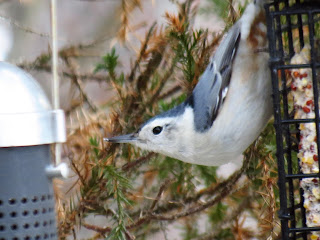NATURE MONCTON INFORMATION LINE, March 16, 2021 (Tuesday)
To respond by email, please address your message to
the information line editor, nelsonpoirier435@gmail.com
Please advise the editor at nelsonpoirier435@gmail.com if any errors are noted in wording or photo
labelling.
For more information on Nature Moncton, check the
website at www.naturemoncton.com
Edited by: Nelson Poirier nelsonpoirier435@gmail.com
Transcript by Susan Richards susan_richards@rogers.com
Info Line #: 506-384-6397 (384-NEWS)
**An interesting comment from Peter Gadd in Miramichi
who has hosted up to 13 NORTHERN CARDINAL
[Cardinal rouge] at his feeder yard
all winter, plus one RED-BELLIED WOODPECKER [Pic
à ventre roux].
Peter reports the last day they tallied 7 Cardinals was March 1st
and now are only seeing a few. That date
as well was the last day they saw their Red-Bellied
Woodpecker, which had been present for 4 ½
months. One has to hopefully assume the
oncoming season has cause them to disperse to be thinking of pair-bonding and
nesting territories. It is so hoped this
is the case to provide an increased range for the Northern Cardinal in New
Brunswick. It would be interesting to
hear of other feeder yards that have had more than 2 birds that may have
experienced the same. My own pair that I
had is now attending a neighbour’s quieter feeder. They seemed to leave me when a major
onslaught of COMMON REDPOLL [Sizerin flammé] hit. Several
other species seemed to react similarly to the Common Redpoll invasion but that
excuse should be a memory soon as the Redpolls will soon be filing flight plans
North.
**Brian Stone went to Rue Niles to look for the BLACK-HEADED
GULL that was seen there Sunday but did not find it after a 2 hour wait. The
weather was brutal. The wind was crazy strong and freezing. Attached photos
attest to that. Any sensible Black-headed Gull was possibly wisely taking cover!
Brian did
get several gull photos. At this time, gulls are molting into next stage
plumage so will leave folks to peruse age class and species. Brian also got a
video of an ICELAND GULL having a Polar Bear bath.
** Ray
Gauvin submits photos
of what he suspects to be a HOARY REDPOLL.
It seems to prefer to be a loaner.
The front appears lighter in colour, especially in the chest and
underneath area and has smaller stubby beak and red spot on head seems to
be a smaller cap and close to the beak.
It seems to be on the nyjer
feeder more so, than all over everything, like the Common Redpolls.
**Tonight, Tuesday night, March 16 is Nature Moncton
March meeting night with a virtual visit from an expert Dr. Jack Terhune, on
The Life and Times of Resident Seals that choose to visit us, and resident
Seals and Seals that visit us at certain times of the year. This is surely a subject we don’t get much
information on in Nature club presentations, so a don’t-miss presentation for
anyone anywhere to join in and share with us at the link below at 7 o’clock
tonight. Set your cellphone clocks now! The write up is attached below.
https://us02web.zoom.us/j/87668849964?pwd=K05mdVg1L0pQNjdJVjVLNTJkWDZoZz09
Nature
Moncton March Meeting
March 16,
2021 7:00 PM
Presenter:
Dr. Jack Terhune
Maritime
Seals: the permanent residents and winter visitors
Harp and
Hooded seals come to the Gulf of St. Lawrence to breed in March, before they
head back to the Arctic for summer feeding.
Harbour and Grey seals live in the Gulf of St. Lawrence and Bay of Fundy
year-round. Their breeding biology
emphasizes avoiding predators and there are two nursing strategies:
stay-at-home mums or working mums. For
Harbour and Grey seals, finding a safe place to rest is important and the high
tidal range in the Bay of Fundy means that they must stay awake on shore.
Dr. Jack Terhune
holds out at UNB Saint John at the moment, but his extensive research career
has taken him to do research in Denmark, ice fields east of Greenland, and
Eastern Antarctica as well as closer to home in the Gulf of St. Lawrence and
the Bay of Fundy.
Jack will
share his wealth of knowledge with us that will be welcome information for
naturalists to have in their backpacks.
Dr. Terhune
comments”, his retirement in 2012 “did not take” and he is still very active
with students and ongoing research collaborations.
A do not
miss presentation!
Nelson Poirier,
Nature Moncton










